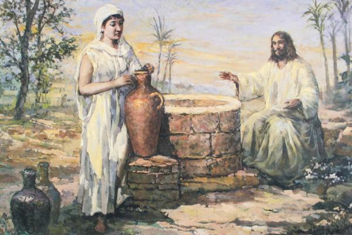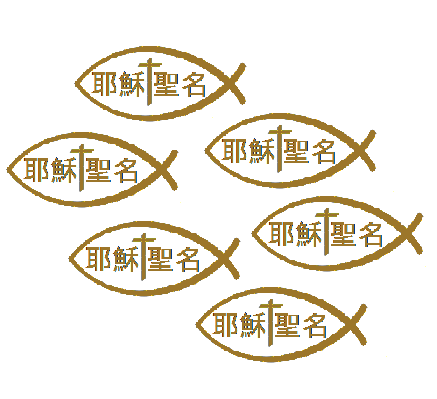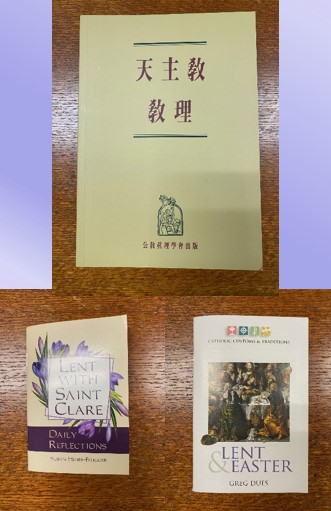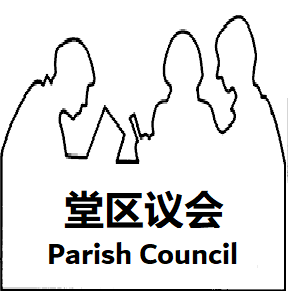
Step by Step in Faith
A little background on John 4: Samaria was a region located between Judea in the south and Galilee in the north. In Jesus’ time, Samaria was joined to Judea under Roman rule. Travelers from Judea to Galilee and vice-versa had to pass through Samaria; otherwise, they had to make a detour through the Transjordan (region east of the Jordan River). Some Jews preferred to take the detour because of the hostility between Jews and Samaritans; however, Jesus and His disciples traveled through Samaria and arrived at a town called Sychar. Tired from the journey, Jesus sat down at Jacob’s well. Jesus’ disciples had gone into the town to buy food.
The main theme of John 4 is the series of revelations given by Jesus to the woman which ultimately led the Samaritans in Sychar to believe that He is the Messiah. That is why this story is one of the Gospel readings in Lent – so that catechumens (who are preparing for baptism) and baptized Christians alike may be able to relate their own faith experience to that of the Samaritan woman. The four revelations are as follows: (1) the gift of ‘living water’ (vv10-14). (2) Jesus knows man’s intimate secrets (vv16-19). (3) the true worship of the Father ‘in Spirit and truth’ (vv21-24). (4) Jesus is the Messiah (vv25-26).
Let us discuss two of them.
A Samaritan woman came to draw water from the well. Jesus said to her, “Give me a drink.” (Jn 4:7) The Samaritan woman was surprised that Jesus, a Jewish man, would ask her for a drink. So, she said to Him, “How can you, a Jew, ask me, a Samaritan woman, for a drink?” (Jn 4:9) At that point, Jesus revealed to her the gift of ‘living water.’
Jesus said to her, “If you knew the gift of God and who is saying to you, ‘Give me a drink,’ you would have asked him and he would have given you living water…. Everyone who drinks this water will be thirsty again; but whoever drinks the water I shall give will never thirst; the water I shall give will become in him a spring of water welling up to eternal life.” (Jn 4:10, 13-14)
The Samaritan woman said to Jesus, “Sir, give me this water, so that I may not be thirsty or have to keep coming here to draw water.” (Jn 4:15) What, then, exactly is this ‘living water’? Is it something that a person can drink like water or wine? And how can something that a person drinks become a spring of water inside of him?
The answer to this question can be found in John 7. On the last and greatest day of the Feast of Tabernacles, Jesus exclaimed to the Jews, “Let anyone who thirsts come to me and drink. Whoever believes in me, as scripture says: Rivers of living water will flow from within him.” He said this in reference to the Holy Spirit that those who came to believe in Him were to receive. (Jn 7:37-38)
The Holy Spirit is the ‘living water’ which wells up to eternal life (CCC 2652). Does this mean that the Holy Spirit can make us never to be thirsty again? Here, thirst does not mean bodily thirst; rather, it is the thirst for eternal life. The Holy Spirit penetrates man’s heart and soul and becomes in him a wellspring of water, leading him to eternal life.
What are some of the ways in which we can partake of the ‘living water’ which is the Holy Spirit? (1) By frequent reading of sacred scripture. (2) By participating in the Sacraments of the Church: Holy Mass, going to Confession, etc. (3) Through prayer – the Holy Spirit comes to the aid of our weakness; for we do not know how to pray as we ought, but the Spirit intercedes with inexpressible groanings. (Rom 8:26)
The Samaritan woman also brought up the issue of the right place to worship God – was it on Mount Gerizim, where the Samaritans worshiped or was it in Jerusalem, where the Jews worshiped? At that point, Jesus revealed to her the true worship of the Father ‘in Spirit and truth’.
Jesus said to her, “Believe me, woman, the hour is coming when you will worship the Father neither on this mountain nor in Jerusalem… But the hour is coming, and is now here, when true worshipers will worship the Father in Spirit and truth; and indeed the Father seeks such people to worship him. God is Spirit, and those who worship him must worship in Spirit and truth.” (Jn 4:21, 23-24)
In order to worship God ‘in Spirit and truth,’ man must first be filled by the Holy Spirit; from his rebirth in baptism, he receives the grace to become a child of God and is thus enabled to lead a holy life which expresses itself in love. True worship ‘in Spirit and truth’ is possible only in union with Christ and can be done only in and through Him.
Therefore, the worship ‘in Spirit and in truth’ is not tied exclusively to any one place like Jerusalem or Mount Gerizim. Whenever the faithful assemble in one place, they are the ‘living stones’ gathered to be ‘built into a spiritual house’ (1 Pet 2:4-5). Incorporated into Christ by the Holy Spirit, the Mystical Body of the risen Christ, which is the Church, is the spiritual temple of the living God. (CCC 1179)
By her conversation with Jesus, the Samaritan woman was led to faith. How can our conversations with Jesus lead us to grow in faith? The worship of God ‘in Spirit and truth’ is manifested in a holy life which expresses itself in love. What are some of the ways in which we can worship God ‘in Spirit and truth’?

The small group reflection for the month of March entitled “Step by step in faith” is now ready. Please take a copy. Attention small group coordinators, we will have a meeting next Sunday after the 10:30am Mass.

The Chinese Lenten Retreat will be on Saturday, March 18, from 9am to 12noon. We have invited Fr. Tonguk Michael Ku, pastor of Korean Martyrs Church to lead this year’s retreat. All are welcome to attend.

We have collected $3,400 in donations to the Archbishops Annual Appeal. We need $400 more to reach our goal. Thank you for your support.

Our new books and pamphlets on faith and spirituality have arrived: 10 copies of the Catechism of the Catholic Church in Chinese are in the Library for your reference on the Catholic faith. You may borrow a copy by signing your name in the Library logbook. 10 copies of “Lent with St. Clare” and “Lent and Easter” are in the church foyer; these pamphlets are in English and are free to take home.

In order for us to begin the meeting and end on time, please proceed to the conference room immediately after Mass.

Prayer List: Vun Lilian, Liang Chenjing, Pan Bohao, Angela Griffin, Wang Dacheng, Long Guorui, Zhang Qiang, Li Kuiying and Xu Taicheng.